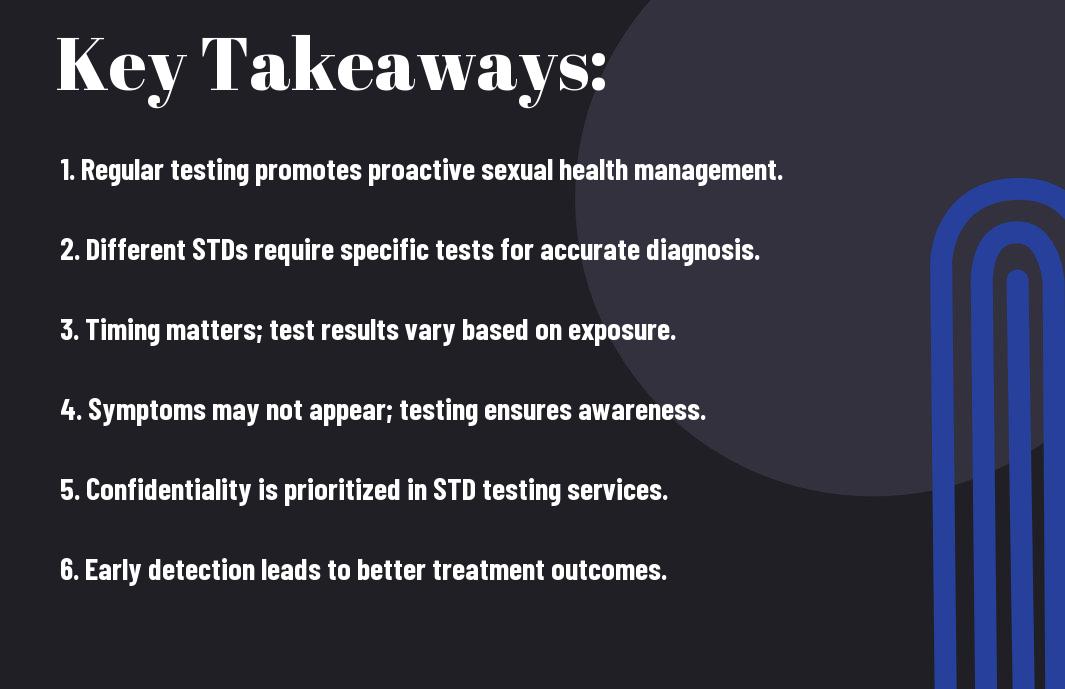Over the years, the conversation surrounding sexually transmitted diseases (STDs) has evolved, yet many remain uncertain about how to protect their sexual health. This blog post will guide you through everything you need to know about STD tests, including when to get tested, what the tests entail, and the importance of early detection. By gaining a clear understanding of these tests, you can take proactive steps to ensure your well-being and maintain a healthy sexual life.

Key Takeaways:
- Types of Tests: Familiarize yourself with various STD tests, including blood tests, urine tests, and swabs for specific infections.
- Regular Screening: Schedule regular screenings based on your sexual activity, as many STDs can remain asymptomatic.
- Transmission Awareness: Understand how STDs are transmitted, which can help in reducing risk and promoting safer sex practices.
- Consultation Importance: Speak with a healthcare provider for personalized advice and to interpret test results accurately.
- Partner Communication: Engage in open conversations with partners about sexual health and testing to ensure mutual safety.

What Are STDs?
While sexually transmitted diseases (STDs) are infections primarily spread through sexual contact, they can also be transmitted through other means. These infections can affect anyone who is sexually active, regardless of age or gender, and often show little to no symptoms, making regular testing and awareness crucial for maintaining your sexual health.
Overview of Common STDs
An overview of common STDs includes infections such as chlamydia, gonorrhea, syphilis, herpes, HIV, and hepatitis. Each of these diseases poses unique risks to your health and can have varying symptoms if left untreated. Being informed about these conditions is key to effective prevention and management.
Symptoms and Risks
What you may not know is that many STDs can be asymptomatic, meaning they do not always present noticeable symptoms. This makes regular testing even more important, as it helps you stay proactive about your sexual health and prevent potential complications.
Plus, the importance of recognizing symptoms such as unusual discharge, sores, or pain during intercourse cannot be overstated. Ignoring these signs can lead to more severe health issues, including infertility or chronic pain. Understanding the potential risks associated with untreated STDs highlights the importance of seeking medical advice and getting tested regularly, ensuring that you maintain a healthy sexual lifestyle.
Importance of STD Testing
Some individuals may underestimate the significance of STD testing, but it’s imperative for safeguarding your sexual health. Regular testing empowers you to monitor your health status, catch infections early, and minimize the risk of complications, benefiting both you and your partners.
Why Testing is Important for Sexual Health
With routine STD testing, you gain peace of mind and the opportunity to take proactive steps toward maintaining your sexual health. Early detection can help prevent long-term health issues, reproductive complications, and protect your sexual partners from potential transmission.
Impact on Public Health
At a community level, widespread STD testing plays a vital role in preventing outbreaks and reducing the spread of infections. When you get tested regularly, you contribute to healthier communities and assist in lowering infection rates, ensuring a safer environment for everyone.
Importance of community-level STD testing cannot be overstated. By prioritizing testing, you help reveal hidden infections that might not show symptoms but can still be transmitted. This is especially critical in reducing prevalence rates and breaking the cycle of infection, as many cases of STDs go unnoticed. A collective commitment to testing supports informed decisions that strengthen sexual health education and resources, leading to a healthier population overall. Ultimately, your awareness and action can create a ripple effect, fostering a community where people are more knowledgeable and proactive about their sexual health.
Types of STD Tests
Now, understanding the different types of STD tests available can help you make informed decisions about your sexual health. Here’s a quick overview of the main testing methods:
| Type of Test | Description |
|---|---|
| Blood Tests | Used for detecting certain STDs from a blood sample. |
| Urine Tests | Involves analyzing urine to identify infections. |
| Swab Tests | Collects samples from genital or anal areas. |
| Rapid Tests | Quick screening for certain STDs. |
| At-home Tests | Convenient option for privacy. |
After learning about these options, you can choose the testing method that suits your comfort level and situation.
Blood Tests
One common method for detecting STDs is through blood tests. These tests can identify infections like HIV, syphilis, and hepatitis, and are often performed at clinics or healthcare facilities. By drawing a small amount of blood, healthcare providers can assess for specific antibodies or pathogens that indicate the presence of an STD.
Urine Tests
Among the various testing methods, urine tests are a non-invasive way to screen for STDs such as gonorrhea and chlamydia. This method only requires you to provide a urine sample, making it an easy option for many individuals concerned about their sexual health.
Types of urine tests can vary, but they typically involve analyzing your urine using laboratory techniques to detect the presence of specific bacteria or genetic material associated with STDs. This method is particularly advantageous because it eliminates the need for physical examination, offering both convenience and discretion.
Swab Tests
Among the most effective methods for diagnosing certain STDs are swab tests. These involve taking a sample from the affected area, such as the cervix, urethra, or throat, allowing for a more targeted analysis of infections like herpes or trichomoniasis.
To ensure accurate results, it’s important to follow the instructions provided by your healthcare provider during the swab collection process. They may use a cotton swab or a specialised device to gather sample cells, which are then tested for signs of infection, bringing peace of mind to your sexual health journey.
Where to Get Tested
Many people wonder where they can get tested for STDs. You have various options, ranging from healthcare providers to community health clinics and even at-home testing kits. For a comprehensive overview, you can check out Navigating STI testing: Everything you need to know.
Healthcare Providers
Behind your healthcare provider’s door lies a wealth of resources for STD testing. Your doctor can offer personalized advice, as well as administer tests tailored to your specific risk factors and sexual history.
Community Health Clinics
Behind the doors of community health clinics, you will find a welcoming environment dedicated to your sexual health. These clinics often provide affordable or even free testing, ensuring that everyone has access to important health services regardless of their financial situation.
Another significant advantage of community health clinics is their focus on inclusivity and discretion. Staff members are trained to handle sensitive topics, and they create a safe space for you to discuss your concerns about STDs. Many clinics also offer educational resources to help you understand your sexual health better.
At-Home Testing Kits
For those who prefer privacy, at-home testing kits are an excellent option. They allow you to collect samples in the comfort of your home, providing you with convenience and discretion.
Due to their easy accessibility, at-home testing kits have gained popularity. Many kits offer a wide range of testing options, including for multiple STDs. Just ensure you choose a reputable provider for accurate results. After sending your samples back to the lab, you’ll receive your results online, allowing you to take control of your sexual health on your terms.
Preparing for an STD Test
Keep in mind that preparation is vital for an effective STD test. Arriving informed can reduce anxiety and help you understand the process better. Make sure to gather any relevant medical history and list any symptoms you may have experienced. Communicating openly with your healthcare provider will ensure you receive the right tests and advice tailored to your sexual health.
What to Expect During the Test
For your STD test, you can expect a professional and respectful environment. Depending on the tests required, the procedure may involve a simple urine sample, blood draw, or swabs from genital areas. Healthcare professionals will guide you through each step, explaining what is happening to alleviate any concerns.
Tips for Before the Test
What you do before your STD test can set a positive tone for the experience. Consider these tips:
- Ensure you are well-hydrated to facilitate easier blood or urine collection.
- Avoid sexual activity for 24-48 hours before the test to ensure accurate results.
- Discuss any medications you are taking with your healthcare provider.
- Be honest about your sexual history and any symptoms.
Knowing these details will help you feel more at ease during the testing process.
In addition to these tips, being prepared mentally is just as important. You may find it helpful to:
- Practice breathing exercises to manage anxiety.
- Write down any questions you have for your healthcare provider.
- Bring a friend for support if permitted.
- Understand the importance of early detection for your sexual health.
Knowing what to expect and how to prepare can lead to a smoother testing experience and encourage you to prioritize your health.
Understanding Your Test Results
After receiving your STD test results, it’s vital to understand their implications for your sexual health. Knowing whether you tested positive or negative can guide your next steps in seeking treatment or adopting preventive measures. Each test result carries different meanings, and comprehending these can help manage your health and relationships moving forward.
Interpreting Positive Results
Around one in two sexually active individuals will contract an STD at some point in their lives. A positive result can be daunting, but it is vital to view it as a starting point for managing your health. Many STDs are treatable, and reaching out for medical advice can help you navigate the available treatment options.
Resources for Further Action
By proactively seeking resources and support after a positive STD test result, you can take charge of your health. Multiple organizations and clinics offer guidance, treatment, and counseling tailored to your needs.
For instance, local health departments and clinics often have programs that provide confidential treatment and screening options. You can also find support groups for individuals living with STDs, where you can share experiences and gain emotional support. Additionally, reputable online resources offer information on managing your condition, preventing transmission, and understanding your rights. Seeking out a healthcare professional is equally significant; they can offer tailored advice and help you navigate treatment options specific to your situation.
To wrap up
Drawing together the important knowledge about STD tests empowers you to take charge of your sexual health. Understanding the different types of tests, their importance, and how to access them allows you to make informed decisions. By prioritizing regular screenings and open communication with your healthcare provider, you’re not only protecting yourself but also those you care about. Stay proactive and educated about your sexual health to foster safe and fulfilling relationships.
FAQ
Q: What are STD tests, and why are they important?
A: STD tests are medical screenings that check for sexually transmitted diseases (STDs) in individuals. They are important because many STDs can be asymptomatic, meaning individuals may not show any symptoms but can still transmit the infection to others. Regular testing helps in early detection, which can lead to timely treatment, preventing complications and reducing the risk of transmission to partners.
Q: How often should I get tested for STDs?
A: The frequency of STD testing depends on your sexual activity and risk factors. It’s generally recommended that sexually active individuals get tested at least once a year. However, if you have multiple partners, engage in unprotected sex, or have a new partner, more frequent testing may be advisable. Consulting with a healthcare provider can help tailor a testing schedule that is right for you.
Q: What types of STD tests are available?
A: There are various types of STD tests, including blood tests, urine tests, and swab tests. Common tests include those for chlamydia, gonorrhea, syphilis, HIV, and herpes. The type of test required may depend on your symptoms, sexual history, and the specific STDs you are being tested for. A healthcare provider can guide you on which tests are appropriate for you.
Q: How are STD tests conducted, and what should I expect during the process?
A: STD testing is typically a straightforward process. It may involve providing a urine sample, a blood draw, or a swab from the genital area. The healthcare professional will explain the procedure and ensure your comfort. Results can often be provided within a few days, and your provider will discuss what the results mean and any necessary follow-up actions.
Q: What do I do if my STD test results are positive?
A: If your STD test results are positive, it is crucial to consult with your healthcare provider for further evaluation and treatment options. Many STDs are treatable, and early intervention can lead to better health outcomes. It’s also important to inform your sexual partners so they can get tested and treated if necessary. Support and counseling resources are also available to help you navigate this situation.



